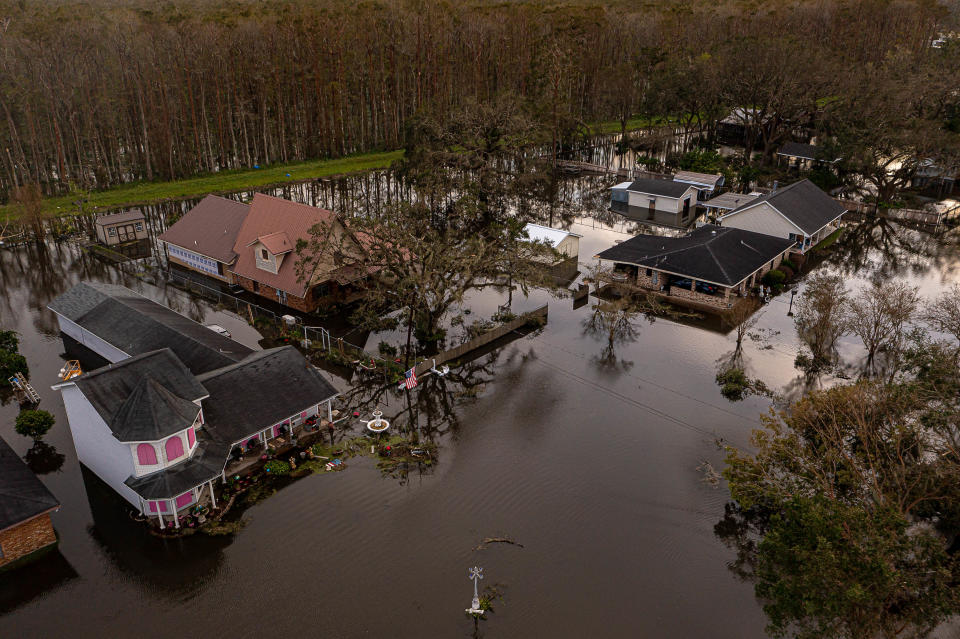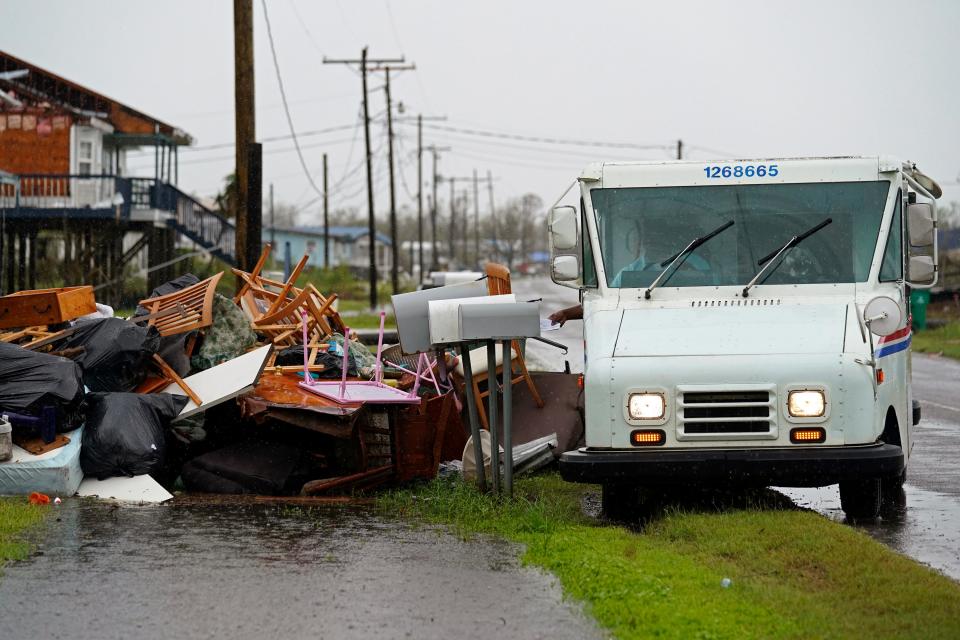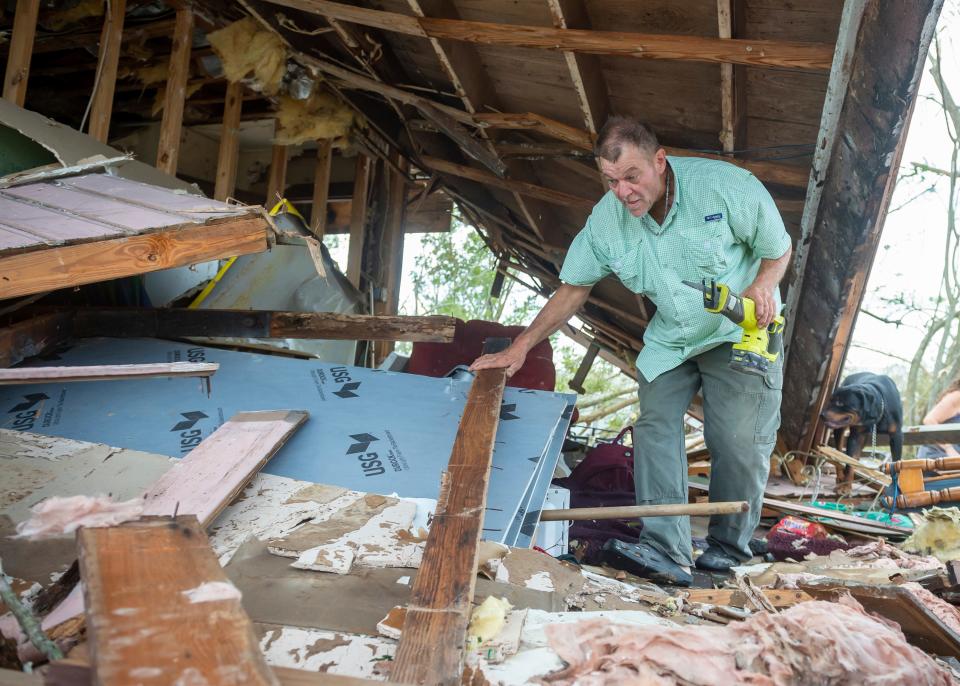10 ways Houma-area residents can weather the next hurricane safely
Preparation is crucial when it comes to hurricane season, which runs from June 1 through Nov. 30.
Follow these 10 tips and you’ll go a long way toward ensuring you and your loved ones stay safe and your property is as secure as possible.
1. Make a plan now
Officials from both Terrebonne and Lafourche parishes maintain the most important thing residents can do to ease stress during a storm is to have a plan.
Read this: This hurricane season will pose unique challenges in Lafourche. Here are some of them.
Related: Louisiana will do extra checks of nursing home evacuation sites before hurricane season
Start by visiting getagameplan.org, run by the Louisiana Office of Emergency Preparedness.
Determine where you and your family will go, what you will bring, how you’ll get there and what you will do with elderly or special-needs family members as well as pets.
Keep phone numbers for hotels on hand to check rates and book rooms in advance. Traveling to a friend or family member’s home usually is the best plan if their homes are structurally safe and outside the risk area. As a last resort, go to a designated shelter.
2. Buy flood insurance and review your homeowner’s policy

You can buy a National Flood Insurance policy through most local insurance agents. Officials say many residents are unaware that flood insurance isn't automatically included in a homeowner’s policy.
Because there’s a 30-day waiting period before flood insurance takes effect, officials recommend buying it as soon as possible. Keep an electronic copy that can be accessed easily, either on a USB drive you can take with you if an evacuation is ordered or stored in the cloud with a service like Dropbox or Google Drive.
Review your homeowner’s policy to ensure it offers adequate coverage against wind damage and hail. Like flood insurance, that coverage might not be included in your homeowner’s policy and may have to be purchased separately.
Other tips are to save your insurance agent’s number in your mobile phone and use a video or camera to document everything in your house so you can use it to file damage claims.
3. Prepare a disaster kit now
Keep documents, keepsakes, clothing, medicine, food and a first-aid kit in an easy-access storage area so when it’s time to pack, they’re ready to go. Keep copies of prescriptions and, if possible, have your doctor supply additional refills ahead of time. Stock up on water.
4. Leave early and stay tuned

Leaving before state officials enact contraflow, routing interstate traffic one way, away from the storm, will make it easier to find safety. The best direction to head is north, away from the storm.
Make sure your vehicle is in safe condition and has enough fuel and other supplies for a lengthy time on the road. Check your tires and spares and keep a jack in the car. Monitor local television and radio stations to stay current on evacuation routes, traffic and storm conditions.
The Courier and Daily Comet’s websites, houmatoday.com and dailycomet.com, are the best source of local news on the storm. Check the newspapers' Facebook pages along with those of parish and state emergency preparedness offices.
5. Plan for special needs
Check with elderly family members to find out their disaster plans and prepare places for them to go ahead of time. If you have a family member in a nursing home or hospital, ask now about that facility’s plans for a hurricane — whether it plans to evacuate patients or residents, how it plans to evacuate them, where it will take them and other specific questions.
Make sure special needs family members have medicine, prescription refills, any special foods they require, health insurance policy information and phone numbers for local Councils on Aging, 868-8401 in Terrebonne and 537-3446 in Lafourche.
6. Plan for pets
Have at least five days’ worth of food, water, treats and medications for each pet.
Keep up-to-date medical records, including vaccinations, as well as an ID collar, pet carrier or cage, leash, a favorite toy, trash bags, food and water bowls, kitty litter and a current photo of the pet.
Plan now to keep your pet with you or board the pet in kennels or at the home of a friend or relative out of harm’s way.
From Bill Ellzey: Best places to 'head for the hills' ahead of a hurricane? Friends on high ground.
'A new chance at life': Group completes first two homes in Dulac for Ida victims
For information on planning for pets, call the Terrebonne Animal Shelter at 873-6709 or the Lafourche Shelter at 446-3532.
7. Protect your valuables

Keeping copies of important documents is key.
Scan documents into your computer and keep digital copies on a USB drive or backed up on online services such as Dropbox or Google Drive. Do the same with your photos.
Keep your Social Security cards, birth certificates, marriage and death records, driver’s license, cash, credit cards, bank account information, wills, insurance policies, deeds, mortgages, contracts, stocks, bonds, cameras, watches, jewelry, computer backups and photos and videos in waterproof containers or plastic bags.
8. Save money
The costs of evacuating can pile up. Start saving now, even if it means setting aside a little at a time. Saving a dollar every day will give you $365 in one year, enough for gas and a night or two at a hotel.
If a storm doesn’t happen during the year, keep the savings going. That will leave you more prepared next season.
'We just want a home': Nearly 1,000 Houma-area residents are still waiting on FEMA housing after Ida
Estimate what you need to secure your home and valuables plus the cost of five to seven days’ worth of food and supplies and travel expenses.
Buy plywood, storm shutters, water, nonperishable food, generators and other supplies now so you won’t face long lines or empty store shelves later.
9. Prepare your home
Now is the time to survey your yard for any rotting or precarious trees, branches or shrubs and remove them.
If you’re in a FEMA trailer, parish officials will urge you to evacuate even for tropical storms. If you are living in a home with a blue roof or other significant damage from Ida, you’re encouraged to do the same.
Plan for how you will secure items in your yard, such as playhouses, so they don’t become projectiles.
Using tape on windows is not recommended. Instead, make hurricane shutters now so you don’t waste valuable time later.
10. Plan for family communication
Make sure each member of your family is clear on what the emergency plan is, then share that plan with a family member or friend out of state.
That person should become a point of contact for you and other family members to relay your locations as well as other information should you become separated.
Also, prepare for phone lines, cellphone service and internet to be down or disrupted.
If a family member plans to evacuate on a government bus, make sure he or she carries a cellphone and a battery-powered charger. Make sure you and your loved ones have shared your cell numbers.
This article originally appeared on The Courier: 10 ways to weather the next hurricane safely in Terrebonne, Lafourche

